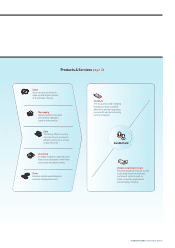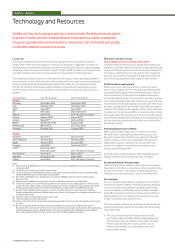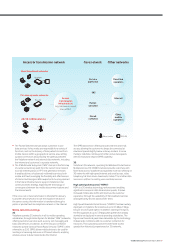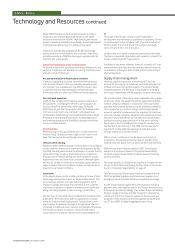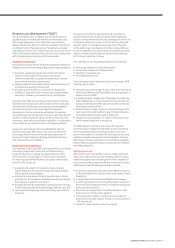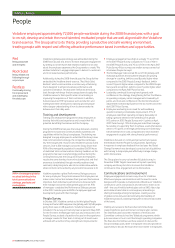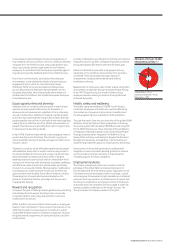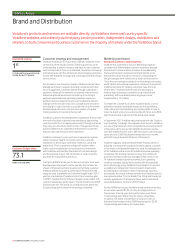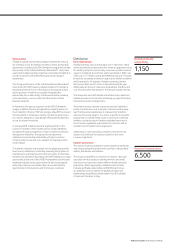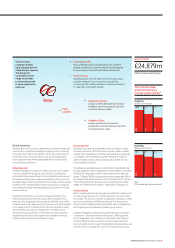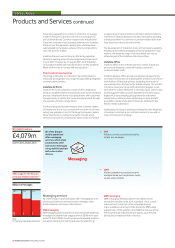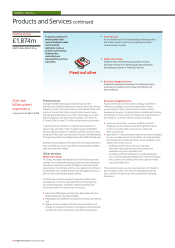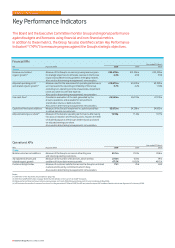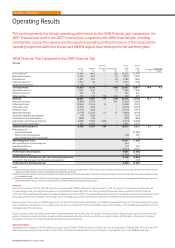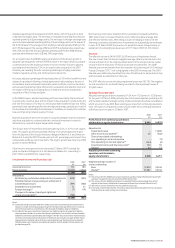Vodafone 2008 Annual Report Download - page 27
Download and view the complete annual report
Please find page 27 of the 2008 Vodafone annual report below. You can navigate through the pages in the report by either clicking on the pages listed below, or by using the keyword search tool below to find specific information within the annual report.
Voice services
continue to make
up the largest portion
of the Group’s revenue.
The Group has
undertaken a wide
range of activities
to stimulate growth
in voice usage in the
past year.
Voice services
Revenue from voice services, earned when customers make and
receive calls, is classified primarily as outgoing voice, incoming
voice and voice roaming. In addition, the Group is delivering on
customers’ total communications needs and driving greater
voice usage through offering integrated fixed location based
communications services.
Outgoing voice
The fees charged to a Vodafone mobile customer who initiates
a call are classified in outgoing voice revenue. Despite price
pressures in many markets due to the competitive environment,
increased outgoing voice usage generated from the success of
the wide range of tariffs and propositions on offer and the overall
increase in the customer base in the Group has led to outgoing
voice revenue staying relatively stable as a proportion of Group
service revenue.
Propositions relating to voice services feature heavily in the
tariffs and promotions that the Group offers its customers. In
particular, the development of a range of unlimited value offers
has been particularly appealing to customers and has stimulated
voice usage growth. An example includes free weekend calling,
which had strong customer acceptance in markets such as
the UK, Germany and Ireland. These offers increase customer
engagement with their mobile phone and Vodafone services
in general, driving a broader increase in usage.
£24,879m
Voice revenue
(2007: £22,268m, 2006: £21,304m)
Incoming voice
Incoming voice revenue is generated when a Vodafone mobile
customer receives a call from a user on another fixed or mobile
network. Fees classified as incoming voice revenue are generally
not charged to the Vodafone customer receiving the call but,
rather, the telecommunications company that routed the call
to the Vodafone network.
These fees are generally based on termination rates determined
by local regulators. Due to regulation in many markets it has been
the trend for these rates to fall in recent years, and for the year
ended 31 March 2008 incoming voice revenue generated 14% of
the Group’s total service revenue. This has declined from 15% and
17% in the previous two financial years respectively. For further
details see “Additional Information – Regulation” on page 147.
Voice roaming
When travelling abroad, roaming allows Vodafone’s customers to
use the Group’s services on a mobile network in a country they
are visiting. The Group continued to expand its roaming coverage
and services during the 2008 financial year. The focus was to
drive customer satisfaction through greater value, transparency
and simplicity across Vodafone’s roaming propositions.
Vodafone’s flagship roaming tariff, Vodafone Passport, enables
customers to “take their home tariff abroad”, offering greater
price transparency and certainty to customers when they are
roaming. While abroad, customers can make calls using their
domestic tariff, in some cases including free minute bundles, and
receive calls at no charge for a one-off connection fee per call.
Vodafone Group Plc Annual Report 2008 25
Vodafone At Home
A range of offers designed to introduce
Vodafone into the household as a total
communications provider.
Voice
Vodafone Office
A series of products and services
designed to meet all business customers’
communications needs.
Innovative tariffs
Many different tariffs and propositions are available,
targeted at different customer segments and adapted
for any localised customer preferences and needs.
Voice roaming
Roaming allows users to make and receive calls using
a mobile network in the country they are visiting.
A roaming tariff, Vodafone Passport, enables customers
to “take their home tariff abroad”.
2008
2007
2006
Note:
(1) Germany, Italy, Spain and the UK
2008
2007
2006
Voice minutes usage
growth for the Group’s
principal mobile markets(1)
Outgoing
(billions of minutes)
70.987.9
106.9
Incoming
(billions of minutes)
35.137.440.8
Fixed
Location


